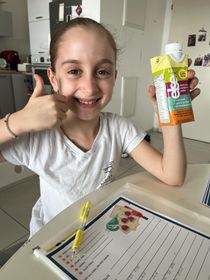Micronutrient Needs of Infants and Toddlers
Wondering about what nutrients your little one needs? This guide breaks down the essential vitamins and minerals for infants and toddlers, helping parents ensure their child gets the best start in life.
Updated May 30, 2024

Understanding the nutrient needs of infants and toddlers is important for the proper growth and development of tiny minds and bodies. This means knowing how to meet your child’s needs, some of the best sources of each nutrient, and special considerations for kids on a plant-based diet.
» Try this plant-based formula for a nutritional boost for your little one
What are micronutrients?
Macronutrients and micronutrients make up all of the nutrients in our diet. Macronutrients include carbohydrates, fat, and protein, and micronutrients refer to vitamins and minerals. The prefix “micro-” means that we need relatively small amounts of these nutrients to meet our daily requirements.
Still, those small amounts are still critically important. Micronutrients are necessary for the health, function, and development of brains, bodies, and bones. Vitamins and minerals are needed to perform a variety of functions in your body, such as immunity, blood clotting and circulation, energy production, brain function, skin integrity, bone development, and fluid balance.
» Confused about your baby's vitamin and mineral needs? Learn more in our baby nutrition guide
There are two types of vitamins. Fat-soluble vitamins include A D, E, and K, are best absorbed with dietary fat sources, and are stored in fatty tissue. Water-soluble vitamins include vitamin C and the B vitamins. These dissolve in water, are not stored long in the body, and are flushed out through urine when in excess.
There are also two categories of minerals. Macrominerals are needed in larger amounts. These include calcium, sodium, phosphorus, magnesium, potassium, chloride, and sulfur. Trace minerals are needed in small amounts and include iron, copper, manganese, zinc, iodine, fluoride, and selenium.
» Discover mineral-rich yummy protein shakes for your little ones
Micronutrient needs for infants and toddlers
Micronutrients are an essential part of your young child’s diet. Below are the recommended daily requirements for infants and toddlers under 4 years old. As you can see, the needs for most micronutrients increase with a child’s age. A steady supply of vitamins and minerals from the diet is necessary for optimal growth and function.
Daily micronutrient requirements for infants and toddlers
Vitamin C
Infants: 35 mg Toddlers: 40 mg
Calcium
Infants: 600 mg Toddlers: 800 mg
Iron
Infants: 15 mg Toddlers: 10 mg
Vitamin D
Infants: 400 IU Toddlers: 400 IU
Vitamin E
Infants: 5 IU Toddlers: 10 IU
Thiamin
Infants: 0.5 mg Toddlers: 0.7 mg
Riboflavin
Infants: 0.6 mg Toddlers: 0.8 mg
Niacin
Infants: 8 mg Toddlers: 9 mg
Vitamin B6
Infants: 0.4 mg Toddlers: 0.7 mg
Folate
Infants: 100 mcg Toddlers: 200 mcg
Vitamin B12
Infants: 2 mcg Toddlers: 3 mcg
Biotin
Infants: 50 mcg Toddlers: 150 mcg
Pantothenic Acid
Infants: 3 mg Toddlers: 5 mg
Phosphorus
Infants: 500 mg Toddlers: 800 mg
Iodine
Infants: 45 mcg Toddlers: 70 mcg
Magnesium
Infants: 70 mg Toddlers: 200 mg
Zinc
Infants: 5 mg Toddlers: 8 mg
Copper
Infants: 0.6 mg Toddlers: 1 mg
Micronutrients for vegan children
Kids raised on a plant-based diet have the same micronutrient requirements as other kids. But they may have a more difficult time finding certain ones that are usually found in animal foods. In this case, a micronutrient-containing supplement made specifically for children is a good idea, in addition to a balanced diet full of whole plant foods.
» Read everything about the benefits of plant-based diet for your toddler
For example, vitamin B12, vitamin D, iodine, and iron may be more difficult to find in adequate amounts on a vegan diet, especially because young children tend to go through periods of selective eating or meal skipping. That being said, a vegan diet can absolutely be appropriate and adequate for children, if balanced nutrition is taken into consideration. Be sure to have your child’s nutritional status and diet evaluated by a registered dietitian if you have any concerns. Else Nutrition's Plant-Based Toddler Formula is rich in iron, which makes it the best complete nutrition drink for handling your child's nutritional needs.
Best sources of micronutrients for children
Vitamins and minerals are found in a variety of whole foods. The best way to meet your child’s micronutrient needs is to offer a diet full of healthy, colorful foods rich in plants.
Breastmilk or infant formula will meet your infant’s needs until she is old enough to start weaning. At that time, first foods prepared in age appropriate ways can be great sources of vitamins and minerals for kids.
Fruits, vegetables, and whole grains can be made into purees, soft-cooked, or cut into small pieces as your child gets older. Smoothies, sauces, protein shakes and even batters for baked goods like pancakes and muffins can be great vehicles for micronutrient-dense ingredients.
Else Nutrition makes an alternative to toddler formula that is another great option for parents looking for convenient ways to add micronutrients into their child’s diet. Else products is made with plant-based ingredients and provide all of the micronutrients to help meet your child’s needs.
*The content and advice provided in this article is for informational purposes only and is not a substitute for medical diagnosis, treatment, or advice for specific medical conditions. Always consult a pediatrician to understand the individual needs of your child.








